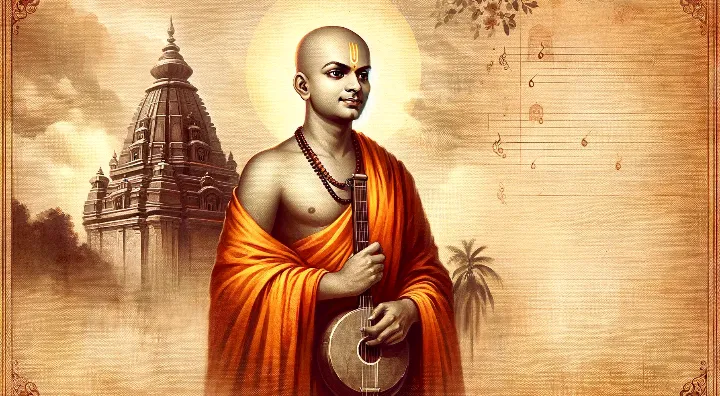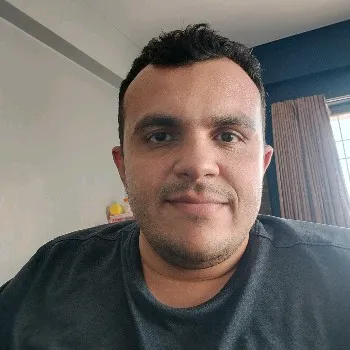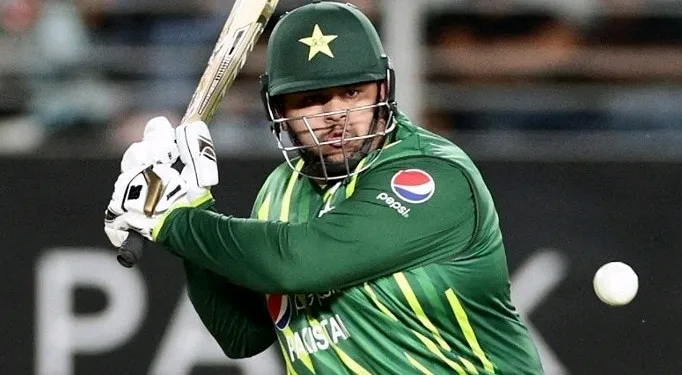Pills of Positivity Part 3 - Purandara Das - The father of Carnatic Music.
This is the continuation of my series called ‘Pills of Positivity’ in which I throw a light upon the lives of various saints, bards, lyricists, music composers and pioneers of the ‘Bhakti Movement’ (Devotional Movement) in mediaeval India, which inspired Indians to break-free from the rigid, caste and class- based hierarchies, by collectively engaging in spiritual pursuits in the form of purest devotion.
In every new post which I upload for this series; I also recommend a very melodious rendition of any one song composed by any saint of the Bhakti movement under consideration to which the ones from younger generations might be able to relate, and I also give out its lyrics.
For the previous two parts of this series you can surf through my story section, which speaks about Meera and Surdas.
Today, the personality of discussion is Purandara Das who is often revered as the father of Carnatic Music!
Purandara Dasa was born in 1484 in Kshemapura, near Tirthahalli, Shivamogga district, in the present-day state of Karnataka, India. His original name was Srinivasa Nayaka. He was born into a wealthy merchant family and was known for his business acumen, which made him one of the richest merchants in the region. Despite his wealth, his early life was marked by materialism and a lack of spiritual engagement.
The turning point in Srinivasa Nayaka's life came through a series of events that led to a profound spiritual awakening. According to popular legend, a significant incident involved a poor man asking Srinivasa for help in the name of the Lord Vishnu, which eventually led him to realise the impermanence of wealth and the importance of compassion and devotion to God.
After this transformative experience, he gave away his wealth to the poor and needy and, along with his family, embarked on a spiritual journey.He became a disciple of the renowned saint Vyasatirtha, who named him Purandara Dasa, initiating him into the Haridasa tradition dedicated to the worship of Lord Vishnu. This marked the beginning of his life as a mendicant and devotional singer.
Purandara Dasa's contributions to Carnatic music are immense. He is credited with systematising the teaching method of Carnatic music by structuring graded exercises known as Sarali Varisais and Alankaras, and compositions like Geethams and Kritis, which form the foundation of Carnatic music learning to this day.
He composed over 475,000 songs (though only a fraction of these survive), in Kannada, Sanskrit, and other languages, focusing on Bhakti (devotion) to Lord Vishnu, ethical living, and social responsibility. His compositions, known as Devaranamas and Suladis, are replete with philosophical insights and practical wisdom, making them accessible and relevant to the common people.
Purandara Dasa's legacy is monumental in the realms of both music and spirituality. He is revered not only for his musical genius but also for his role in democratising spirituality, making it accessible to all, irrespective of caste or creed. His teachings and compositions continue to inspire and influence musicians, spiritual seekers, and scholars around the world.Purandara Dasa passed away in 1564 in Hampi, Karnataka. His death marked the end of an era but the beginning of a lasting legacy that continues to shape the Carnatic music tradition and Hindu devotional practices.
________________________________________
One song which I'd like to recommend here by Purandara Das is called - ‘Chandrachooda Shiva Shankara Parvati’ written in Kannada language.
It's a hymn glorifying Shiva through his various characteristics.
What's special about this song is that through this song; Purandara Das has glorified Shiva, even though he himself was a devout Vaishnavaite. For those of you who are unaware; Shaivism and Vaishnavism are still the two largest sects within Hinduism. Shiva is considered to be the Supreme God in Shaivism, while Vishnu holds that stature in Vaishnavism.
But unlike today; the Shaivites and the Vaishnavaites of mediaeval India revered and complemented each other, rather than quarrelling over their deities. It's the devotional aspect which mattered more to them, than bickering over the supreme stature of Shiva and Vishnu, like how it is usually observed in today's Shaivites and Vaishnavaites.
You may listen to its beautiful, contemporary rendition on Youtube, from the channel ‘Aks and Lakshmi’.
Here are its Kannada-lyrics and meaning in English :
Kannada - “Chandra Chooda Shiva Shankara Parvathi…Chandra Chooda Shiva Shankara Parvathi…Ramana Ninage Namo Namo.”
Meaning in English - Salutations to Shiva - the beloved of Goddess Parvathi; Salutations to you who has adorned the Moon on your head like a jewel.
Kannada - “Sundaratara Pinaka Dharahara...Sundaratara Pinaka Dharahara…Gangadhara Gaja Charmambara Dhara...Gangadhara Gaja Charmambara Dhara.”
Meaning in English - Salutations to the Lord Hara (Shiva) - the one who is wearing the skin of an elephant and is holding the mighty ‘Pinaka’ bow in his hand;
Salutations to the Lord Hara (Shiva) - the one holding river Ganga in his hair, controlling her speed through his matted locks.
Kannada - “Dharege Dakshina Kaveri…Dharege Dakshina Kaveri... Kumbhapura Vaasaanu Neene.”
Meaning in English - O Shiva - the one who resides on the Kumbhapura bank of the southern Kaveri river.
Kannada - “Koralali Bhasma Rudrakshava Dharisida…Koralali Bhasma Rudrakshava Dharisida…”
Meaning in English - Wearing a rudraksha necklace, and covered all over by ashes.
Kannada - “...Parama Vaishnavanu Neene. ”
Meaning in English - ‘…You are the supreme Vaishnavaite (meaning the greatest devotee of Vishnu)’.
Kannada - “Garuda Gamana Nama Purandara Vitalana…Garuda Gamana Nama Purandara Vitalana…”
Meaning in English - ‘...Vishnu - The one who flies on an eagle’.
Kannada - “...Prana Preeyanu Nee.”
Meaning in English - ‘…O Shiva, you are dearest to us, like how our life is dear to us, and just like Vishnu is as well’.
Kannada - “Chandra Chooda Shiva Shankara Parvathi…Chandra Chooda Shiva Shankara Parvathi…Ramana Ninage Namo Namo…Ramana Ninage Namo Namo…Ramana Ninage Namo Namo.”
Meaning in English - Salutations to Shiva - the beloved of Goddess Parvathi; Salutations to you who has adorned the Moon on your head like a jewel.
© Kishan Trivedi
#bhakti #music #Song #biography #spiritual #positivevibes #series #pillsofpositivity
In every new post which I upload for this series; I also recommend a very melodious rendition of any one song composed by any saint of the Bhakti movement under consideration to which the ones from younger generations might be able to relate, and I also give out its lyrics.
For the previous two parts of this series you can surf through my story section, which speaks about Meera and Surdas.
Today, the personality of discussion is Purandara Das who is often revered as the father of Carnatic Music!
Purandara Dasa was born in 1484 in Kshemapura, near Tirthahalli, Shivamogga district, in the present-day state of Karnataka, India. His original name was Srinivasa Nayaka. He was born into a wealthy merchant family and was known for his business acumen, which made him one of the richest merchants in the region. Despite his wealth, his early life was marked by materialism and a lack of spiritual engagement.
The turning point in Srinivasa Nayaka's life came through a series of events that led to a profound spiritual awakening. According to popular legend, a significant incident involved a poor man asking Srinivasa for help in the name of the Lord Vishnu, which eventually led him to realise the impermanence of wealth and the importance of compassion and devotion to God.
After this transformative experience, he gave away his wealth to the poor and needy and, along with his family, embarked on a spiritual journey.He became a disciple of the renowned saint Vyasatirtha, who named him Purandara Dasa, initiating him into the Haridasa tradition dedicated to the worship of Lord Vishnu. This marked the beginning of his life as a mendicant and devotional singer.
Purandara Dasa's contributions to Carnatic music are immense. He is credited with systematising the teaching method of Carnatic music by structuring graded exercises known as Sarali Varisais and Alankaras, and compositions like Geethams and Kritis, which form the foundation of Carnatic music learning to this day.
He composed over 475,000 songs (though only a fraction of these survive), in Kannada, Sanskrit, and other languages, focusing on Bhakti (devotion) to Lord Vishnu, ethical living, and social responsibility. His compositions, known as Devaranamas and Suladis, are replete with philosophical insights and practical wisdom, making them accessible and relevant to the common people.
Purandara Dasa's legacy is monumental in the realms of both music and spirituality. He is revered not only for his musical genius but also for his role in democratising spirituality, making it accessible to all, irrespective of caste or creed. His teachings and compositions continue to inspire and influence musicians, spiritual seekers, and scholars around the world.Purandara Dasa passed away in 1564 in Hampi, Karnataka. His death marked the end of an era but the beginning of a lasting legacy that continues to shape the Carnatic music tradition and Hindu devotional practices.
________________________________________
One song which I'd like to recommend here by Purandara Das is called - ‘Chandrachooda Shiva Shankara Parvati’ written in Kannada language.
It's a hymn glorifying Shiva through his various characteristics.
What's special about this song is that through this song; Purandara Das has glorified Shiva, even though he himself was a devout Vaishnavaite. For those of you who are unaware; Shaivism and Vaishnavism are still the two largest sects within Hinduism. Shiva is considered to be the Supreme God in Shaivism, while Vishnu holds that stature in Vaishnavism.
But unlike today; the Shaivites and the Vaishnavaites of mediaeval India revered and complemented each other, rather than quarrelling over their deities. It's the devotional aspect which mattered more to them, than bickering over the supreme stature of Shiva and Vishnu, like how it is usually observed in today's Shaivites and Vaishnavaites.
You may listen to its beautiful, contemporary rendition on Youtube, from the channel ‘Aks and Lakshmi’.
Here are its Kannada-lyrics and meaning in English :
Kannada - “Chandra Chooda Shiva Shankara Parvathi…Chandra Chooda Shiva Shankara Parvathi…Ramana Ninage Namo Namo.”
Meaning in English - Salutations to Shiva - the beloved of Goddess Parvathi; Salutations to you who has adorned the Moon on your head like a jewel.
Kannada - “Sundaratara Pinaka Dharahara...Sundaratara Pinaka Dharahara…Gangadhara Gaja Charmambara Dhara...Gangadhara Gaja Charmambara Dhara.”
Meaning in English - Salutations to the Lord Hara (Shiva) - the one who is wearing the skin of an elephant and is holding the mighty ‘Pinaka’ bow in his hand;
Salutations to the Lord Hara (Shiva) - the one holding river Ganga in his hair, controlling her speed through his matted locks.
Kannada - “Dharege Dakshina Kaveri…Dharege Dakshina Kaveri... Kumbhapura Vaasaanu Neene.”
Meaning in English - O Shiva - the one who resides on the Kumbhapura bank of the southern Kaveri river.
Kannada - “Koralali Bhasma Rudrakshava Dharisida…Koralali Bhasma Rudrakshava Dharisida…”
Meaning in English - Wearing a rudraksha necklace, and covered all over by ashes.
Kannada - “...Parama Vaishnavanu Neene. ”
Meaning in English - ‘…You are the supreme Vaishnavaite (meaning the greatest devotee of Vishnu)’.
Kannada - “Garuda Gamana Nama Purandara Vitalana…Garuda Gamana Nama Purandara Vitalana…”
Meaning in English - ‘...Vishnu - The one who flies on an eagle’.
Kannada - “...Prana Preeyanu Nee.”
Meaning in English - ‘…O Shiva, you are dearest to us, like how our life is dear to us, and just like Vishnu is as well’.
Kannada - “Chandra Chooda Shiva Shankara Parvathi…Chandra Chooda Shiva Shankara Parvathi…Ramana Ninage Namo Namo…Ramana Ninage Namo Namo…Ramana Ninage Namo Namo.”
Meaning in English - Salutations to Shiva - the beloved of Goddess Parvathi; Salutations to you who has adorned the Moon on your head like a jewel.
© Kishan Trivedi
#bhakti #music #Song #biography #spiritual #positivevibes #series #pillsofpositivity
Related Stories







